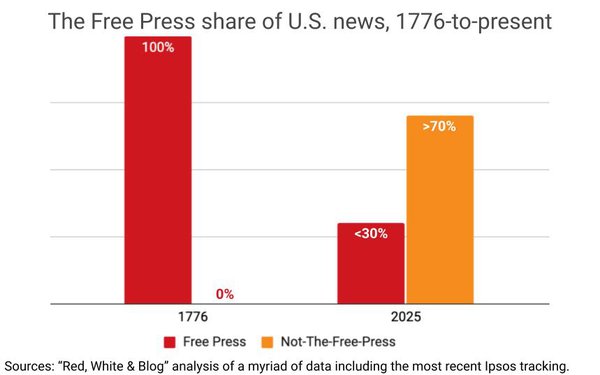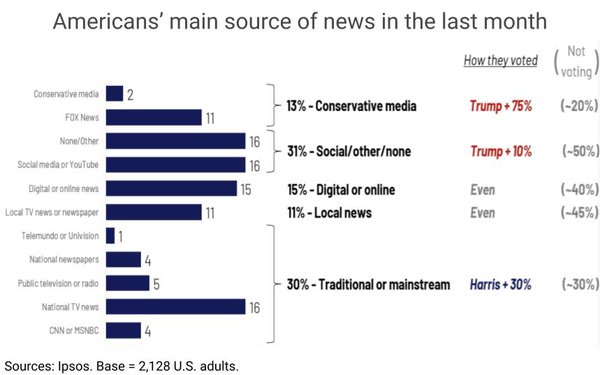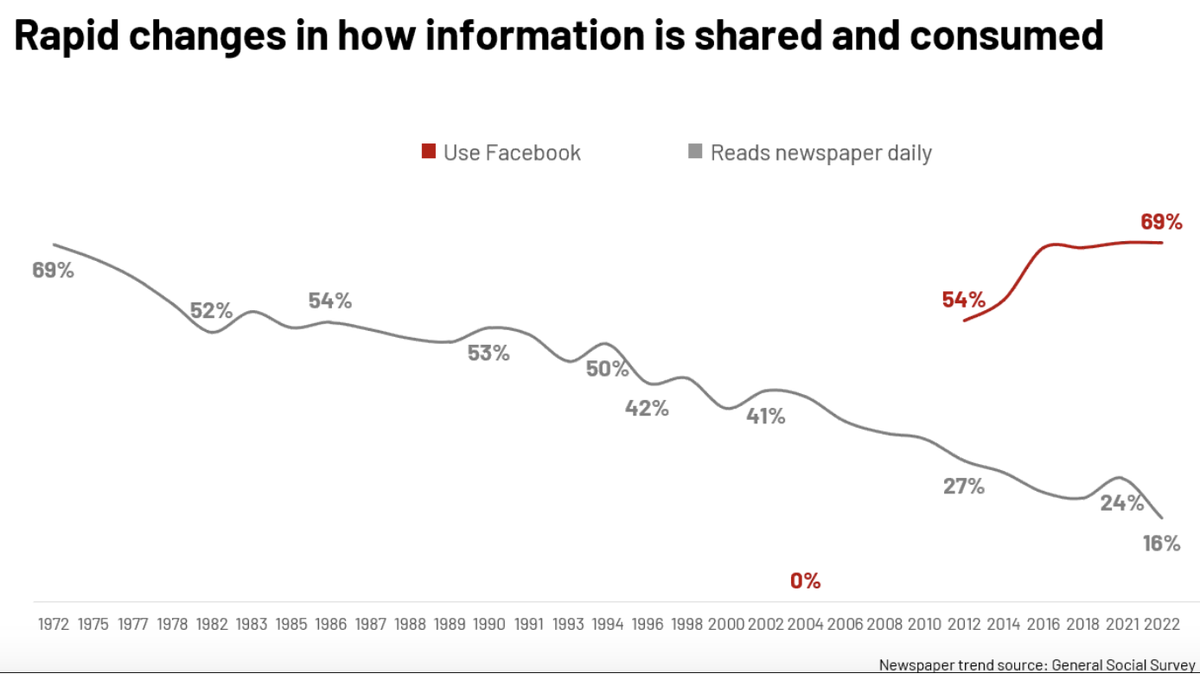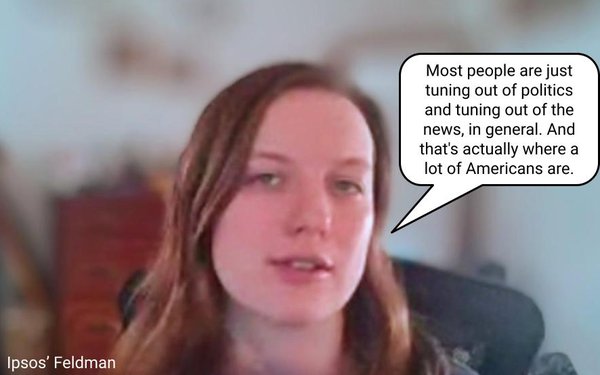
Early in my career as an ad trade journalist, the
founding father of ad industry economics -- the late Interpublic forecaster Bob Coen -- shared a spreadsheet with me showing the growth of ad-supported media over time. It began in 1776, and it
had only one line item on it: print.
I wish I still had a copy so I could show it to you now, but as I recall, the spending wasn't much in 1776 -- well under $1 million -- but I thought it was
fascinating that Coen chose to benchmark the ad-supported media industry's growth beginning with the benchmarking of America's independence.
When I asked Coen what was included in the print
media category back then, he said it was mostly newspapers and a few magazines, some of which were founded by America's founding fathers -- people like Benjamin Franklin, Alexander Hamilton, James
Madison, Thomas Jefferson and Thomas Paine -- which made me think about the role the free press played in the forming of our Constitutional Republic, and why the first amendment they added to the Bill
of Rights had to do with freedom of the press.
advertisement
advertisement
It also made me think about the role advertising played, effectively, in underwriting democracy by helping to inform the electorate.
During the latter part of my career, I have spent much of my time covering -- and frequently editorializing -- about the diminishing influence the free press plays in helping democracy work, as
well as the ad industry's efforts to keep supporting it, especially recently as industry players -- agencies, brands and even trade associations -- have come under legal and regulatory attack for
doing so.
To me, the efforts -- to both undermine the free press as well as the ad industry's right to support it -- seems to be against the spirit America was founded on and what made it
great in the first place.
But I have been surprised by a lot of things about the spirit of America in recent years, especially the fact that so few eligible voters have chosen to participate,
and that a tiny plurality of the ones that do have chosen a democratically dispirited path.
I thought a lot about that this week in particular, including the news that publisher Jeff Bezos was
taking command of The Washington Post's editorial and op-ed section to promote his own personal, business and political agenda.
Coming of age in the early 1970s, The Post's
coverage of a rogue presidency inspired me to go into journalism, and so it is sad that after being a life-long subscriber, I am cancelling my subscription today.
The second reason I was
thinking about the free press this week was the White House's new edict that going forward, it will select which journalists -- and non-journalists -- can participate in the White House press
briefings. This comes on the heels of barring the AP from attending, because the wire service refuses to reference the Gulf of Mexico as the "Gulf of America," in another in a long list of steps
Donald Trump has taken to undermine the free press. And it comes at a time when American democracy needs it more than ever.
And even if you don't agree with much of what the free press
reports, you have to wonder why an increasingly autocratic regime would continually seek to undermine something our founding fathers enshrined as an essential part of our constitutional republic.
Trump began his first full day in office in 2017 by declaring war on the free press, which he dubbed the "fake news," and he has continued to wage it ever since, including both litigiously, as well
as regulatory.
The third reason I've been thinking so much about it this week was listening to this month's briefing by Ipsos' political tracking team -- aptly titled "Knowing The New America"
-- which dug deep into the most recent public polling on the sentiment of Americans -- voters and non-voters alike.
Among the data the Ipsos team shared was what currently is their main source
of news.
Ipsos does not have a category defined as the "free press," so I used its "traditional or mainstream" news media category as a proxy for the chart I began this column with above. I
did that to make a point about the diminishing role of the free press since the founding of our republic.
We can debate these categorizations, and throw in a few others for good measure --
like some of Pew Research Center's recent studies on the increasing reliance Americans have on "news influencers" as a main source of news, or for that matter an increasing swath of "dark media"
sources disseminating misinformation via proxies like social media, bogus MFA sites, and dark social networks -- but if you accept my use of Ipsos' category as a reasonable proxy, the free press is
now less than a third of the news marketplace used by Americans to stay informed.

But if you don't buy that analogy, let me give you another stat presented from Ipsos
showing the curve for Americans who read the kind of daily newspapers our founding fathers deemed to be the free press vs. the curve for Americans who get their news from Facebook, a platform that
discontinued fact-checking news and other information it publishes, because of the "cultural tipping point" of the 2024 presidential election, according to Meta CEO Mark Zuckerberg.

Why is this important? Because researchers -- especially the Ipsos political
tracking team -- have shown that the sources of news information people use have a powerful effect on shaping their perceptions of reality.
In fact, over the past several presidential terms,
the Ipsos team has shown several analyses indicating Americans who primarily access news from conservative media outlets have alternative perceptions of reality not based on provable facts.
I
often ask for an update on that insight during the Ipsos team's monthly political briefings, and since this one was entitled "Knowing The New America," I literally asked if the beliefs of those
conservative media news consumers are now the "primary reality for Americans."
"I don't think they have the primary saying," Ipsos Editorial Director of U.S. Public Affairs Sarah Feldman
responded, noting that those extremist views are based on a small minority of Americans: 13%.
She added that the views of Trump voters, as well as those who voted for Kamala Harris, actually
represent a minority of how Americans think overall, because the majority of Americans eligible to vote do not.
"Most people are just tuning out of politics and tuning out of the news, in
general. And that's actually where a lot of Americans are," she explained.
While conservative media outlets arguably have "a hold" on the new administration and its policies, the Americans who
follow it are a small slice of the overall population, she added.
"We're in a moment where there probably isn't a single reality that unifies the majority of Americans," added Ipsos Senior
Vice President-Public Affairs Chris Jackson, noting: "That's what makes this moment so challenging, particularly for someone who is trying to manage a brand.
"Every time you talk to someone,
you have to assume that they don't know anything and that they're coming with sort of no pre-existing information. You have to feed them essentially all of the things that they need to know in that
engagement. And that's part of our 'Knowing The New America' thesis or point of view.
"It's a very complex environment right now."
